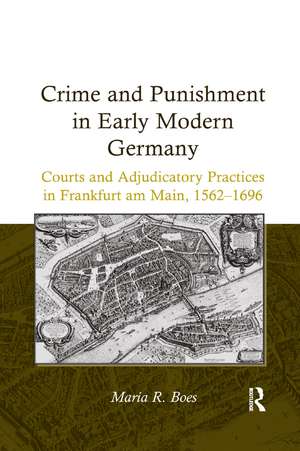Crime and Punishment in Early Modern Germany: Courts and Adjudicatory Practices in Frankfurt am Main, 1562–1696
Autor Maria R. Boesen Limba Engleză Paperback – 6 iun 2019
| Toate formatele și edițiile | Preț | Express |
|---|---|---|
| Paperback (1) | 436.14 lei 6-8 săpt. | |
| Taylor & Francis – 6 iun 2019 | 436.14 lei 6-8 săpt. | |
| Hardback (1) | 1117.07 lei 6-8 săpt. | |
| Taylor & Francis – 28 aug 2013 | 1117.07 lei 6-8 săpt. |
Preț: 436.14 lei
Nou
Puncte Express: 654
Preț estimativ în valută:
83.47€ • 86.91$ • 70.54£
83.47€ • 86.91$ • 70.54£
Carte tipărită la comandă
Livrare economică 07-21 martie
Preluare comenzi: 021 569.72.76
Specificații
ISBN-13: 9781138379756
ISBN-10: 1138379751
Pagini: 296
Dimensiuni: 156 x 234 x 16 mm
Greutate: 0.45 kg
Ediția:1
Editura: Taylor & Francis
Colecția Routledge
Locul publicării:Oxford, United Kingdom
ISBN-10: 1138379751
Pagini: 296
Dimensiuni: 156 x 234 x 16 mm
Greutate: 0.45 kg
Ediția:1
Editura: Taylor & Francis
Colecția Routledge
Locul publicării:Oxford, United Kingdom
Cuprins
Contents: Preface; Part I The City’s Profile: Socio-economic and religious background; Legal/judicial setting. Part II Criminal Detection Methods: Public appearance and criminal judicial practices in early modern Germany. Part III Cultural and Religious/Racial Impediments: On cultural crossroads: gypsies on trial; Targeted twice: Jews as criminal and judicial victims; Enough is enough: two Jewish resistance trials. Part IV Gender Issues: Women and the penal system in Frankfurt am Main, 1562-1696; Women bonding: collaborative infanticide; Choosing death over shame: unwed mothers and infanticide. Part V Sexual Behavior: On trial for sodomy in early modern Germany. Part VI Military Ascendency: Judicial treatments of soldiers for killings unrelated to the battle field. Part VII Desperate Acts: Escapes from judgment: self-inflicted deaths of criminal suspects; Conclusion; Index.
Notă biografică
Dr. Maria R. Boes is Professor Emerita of West Chester University, Pennsylvania. She is the author of numerous articles and book chapters on Early Modern Germany.
Recenzii
'... I strongly recommend this book to readers interested in mechanisms of social discipline and criminal prosecution, religious persecution and toleration, and gender and sexuality in early modern Germany. Boes’s careful archival research brings to life complicated and intimate stories from sixteenth- and seventeenth-century Frankfurt that speak to each of these topics in important ways.' Renaissance Quarterly '... Boes's Crime and Punishment provides many interesting case studies and good insight into early modern Germany's criminal practices related to minorities and marginalized social groups.' Sixteenth Century Journal 'The book's main strength is in its detailed accounts of individual cases, which offer potential insights into both social history and legal thinking. Her cases on Gypsies offer interesting evidence on their uses of language and their interactions with the Christian community.' German History
Descriere
Frankfurt am Main, in common with other imperial German cities, enjoyed a large degree of legal autonomy during the early modern period, and produced a unique and rich body of criminal archives. In particular, Frankfurt’s Strafenbuch, which records all criminal sentences between 1562 and 1696, provides a fascinating insight into contemporary penal trends. Drawing on this and other rich resources, Boes reveals shifting and fluid attitudes towards crime and punishment and how these were conditioned by issues of gender, class and social standing within the city’s establishment. She attributes a significant role in this process to the steady proliferation of municipal advocates, jurists trained in Roman Law, who wielded growing legal and penal prerogatives.









